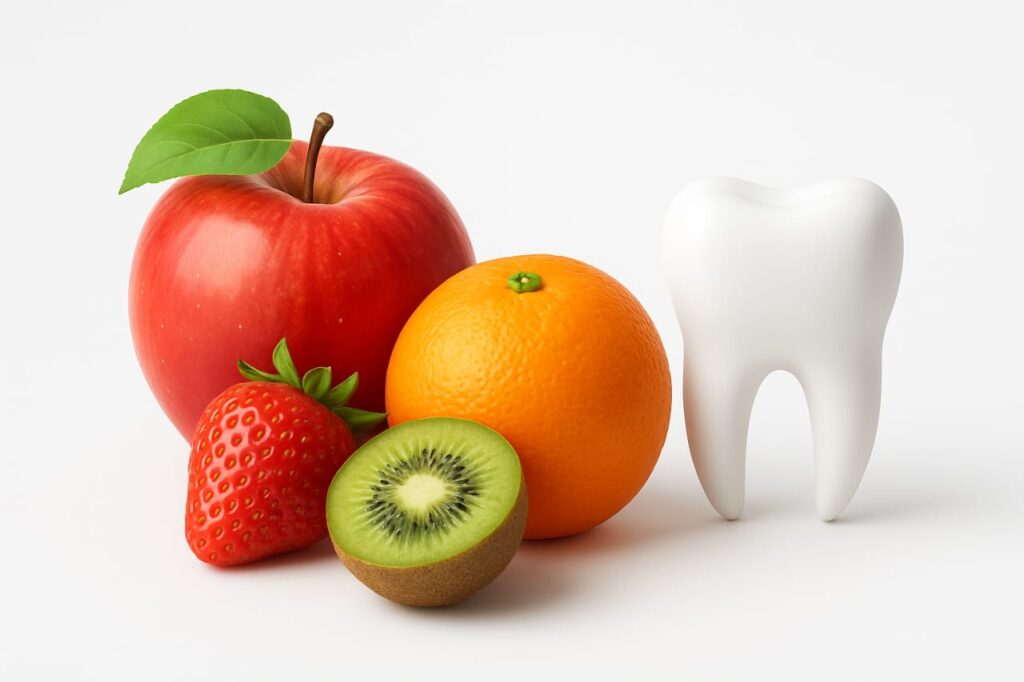Introduction
Your diet has a direct impact on your teeth and gums—according to the American Dental Association’s MouthHealthy program, fruits and healthy foods can protect your smile naturally.
Things like blood sugar regulation, weight, and heart health are often on our minds when we think about keeping ourselves healthy. But often overlooked, oral health is a vital component of our overall well-being. Despite the widespread perception that brushing and flossing are adequate, the truth is that our diet has a substantial influence on the condition of our teeth and gums. Our diet has the power to either make us more vulnerable to issues like cavities and gum disease or to shield us from them. This article will discuss how diet directly impacts oral health and what dietary choices can promote a healthy, self-assured smile.
Apples—Nature’s Toothbrush for Teeth and Gums
Apples are frequently referred to as “nature’s toothbrush” due to their fibrous texture and the fact that chewing them can help clean teeth and increase saliva production, both of which are good for oral health. According to Blue Cross Blue Shield FEP Dental, apples can be a useful addition to your oral hygiene regimen, but they shouldn’t be used in place of brushing and flossing.
The following explains why apples are referred to as nature’s toothbrush:
Scrubbing Action: When you bite into an apple, the fibrous flesh can act as a mild scrub, assisting in the removal of food particles and plaque from your teeth.
Saliva Stimulation: Eating apples stimulates the production of saliva, which can balance out the acids in your mouth and help wash away food particles and bacteria
Strawberries—Whitening Power
The Whitening Power of Strawberries
In addition to being delicious, strawberries may also make you smile. Malic acid, a naturally occurring enzyme found in these succulent red berries, can gradually whiten teeth by removing surface stains. Including strawberries in your diet is a tasty and healthful way to promote a brighter smile, but they won’t take the place of professional treatments. Just keep in mind that they are still acidic, so in order to preserve your enamel, it is best to rinse your mouth with water afterward.
Oranges—Vitamin C Boost
The health benefits of oranges | Good Food
Oranges are a great source of vitamin C, which is vital for boosting immunity and enhancing overall health. One medium orange provides most of the recommended daily intake of vitamin C. Vitamin C, antioxidants, fiber, and folate are all found in good amounts in oranges.
Let’s take a closer look:
Vitamin C Boost: Oranges are a good source of vitamin C, a vital nutrient that the body cannot produce on its own. Vitamin C is essential for immunological response, collagen synthesis, and iron absorption.
Value per Day: Some sources claim that one medium orange can provide almost all of the daily required amount of vitamin C.
Kiwis—Gum Protection
Kiwis are small but powerful because they are a great source of vitamin C, which is necessary for healthy gums. They actually have a higher vitamin C content than oranges! This vitamin is essential for maintaining healthy gum tissue and preventing bleeding, inflammation, and gum disease. Consuming kiwis on a regular basis can strengthen your immune system and improve your body’s capacity to maintain resilient, strong gums. It’s a delicious and tangy method of shielding your smile from the inside out.
Crunchy Fruits vs. Sugary Snacks
Making the seemingly insignificant choice between a crunchy apple and a sugary snack when you’re hungry can have a big impact on your oral health. Crunchy fruits like apples, pears, and carrots help to naturally clean your teeth as you chew by increasing saliva production and aiding in the removal of food particles and bacteria. On the other hand, sugary snacks like cookies, candies, and soft drinks promote the development of harmful oral bacteria, which leads to the creation of acid that erodes tooth enamel and causes cavities. Choosing crunchy, whole fruits not only satisfies your cravings but also keeps your mouth cleaner and healthier.
Don’t miss this related post
9 Proven Banana Health Benefits
Top 7 Fruits That Boost Your Immune System
How to Whiten Teeth Naturally at Home: Effective Tips
Conclusion: Balanced Diet for Oral Hygiene
Brushing and flossing are only one aspect of good oral hygiene; the first step is what you eat. Strong teeth, healthy gums, and an all-around cleaner mouth are supported by a well-balanced diet high in vitamins, minerals, and fiber. You can significantly improve your smile and long-term dental health by choosing crunchy fruits, leafy greens, dairy, and water over sugary and acidic foods. By paying attention to what you eat, you’re not only taking care of your body but also safeguarding your teeth from the inside out. A healthier, more radiant smile tomorrow can result from small dietary decisions made today.
